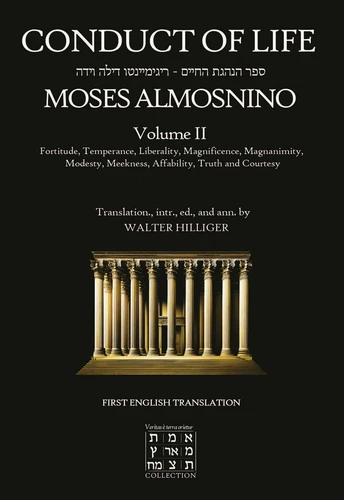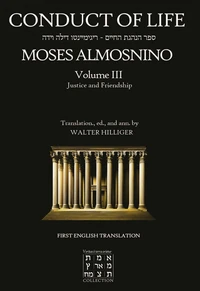R. Moses Ben Barukh Almosnino (c. 1515-1580) was a major figure in Classical Judaism. He settled in the Ottoman Empire, and possessed extensive knowledge of both Jewish and secular subjects and was known for his Responsa and exegeses of Jewish texts. He also took an interest in various scientific fields, translating and commenting on works by Aristotle and other scholars. R. Moses Almosnino wrote on topics such as ethics, including commentaries on the Nicomachean Ethics and Pirkei Avot. He also authored Extremos y grandezas de Constantinopla, a historical work in Judeo-Spanish. His original work Regimiento de vidas, (Conduct of Life) a treatise on ethics, was published during his lifetime in 1564 and remains a reference in classical Judeo-Spanish literature.
Series: Conduct of Life 2
Conduct of Life, volume 2
Par : , Formats :
- Paiement en ligne :
- Livraison à domicile ou en point Mondial Relay indisponible
- Retrait Click and Collect en magasin gratuit
- Nombre de pages230
- PrésentationBroché
- Poids0.232 kg
- Dimensions12,9 cm × 19,8 cm × 0,0 cm
- ISBN978-2-494509-09-2
- EAN9782494509092
- Date de parution05/07/2024
- CollectionVeritas è terra orietur
- ÉditeurLe Cercle Hilliger
Résumé
The major work of Rabbi Moses Almosnino (1515-1580), "Conduct of Life," remains to this day an essential reference in classical Judeo-Spanish literature, now finally available in English in its first translation. First published in Ladino in 1564 as Sefer Hanhagat hachayim, and in 1729 "Regimiento de la vida", this three-volume edition is part of the prestigious collection Veritas è terra orietur.
The work aims to disseminate the timeless teachings of ethics, in the words of the author : "In all that has been said, my intention is only to make you understand how the one who follows the path of virtue and customs of practising good and pure knowledge since childhood, lives a happy and fulfilled life (I, ch. 2)" This second volume addresses the confusion of indeterminism with free will (II, ch.
1) and how virtues arise from free will to surpass the force of destiny (II, ch. 2), their conditions (II, ch. 3) ; the three types of strength or courage, which is the first virtue (II, ch. 4), its five properties and eleven conditions (II, ch. 5) ; as well as the ten ethical virtues, temperance (II, ch. 6), the sixteen properties of liberality (II, ch. 7-8), magnificence (II, ch. 9), magnanimity and its fifty properties (II, ch.
10-12), modesty (II, ch. 13), meekness (II, ch. 14-16), affability (II, ch. 17), honesty or truth (II, ch.18-19), and courtesy (II, ch. 20), following the order and numbering of Aristotle's Nicomachean Ethics (II, ch.1-20). "Conduct of Life" draws heavily from the Nicomachean Ethics but transcends this source by situating itself at the universal intersection of several traditions : Greco-Arabic philosophy, Judeo-Christian scholasticism, classical Sephardic Judaism, and medieval Jewish thought.
Thus, this work contributes to peace and intercultural understanding among peoples.
The work aims to disseminate the timeless teachings of ethics, in the words of the author : "In all that has been said, my intention is only to make you understand how the one who follows the path of virtue and customs of practising good and pure knowledge since childhood, lives a happy and fulfilled life (I, ch. 2)" This second volume addresses the confusion of indeterminism with free will (II, ch.
1) and how virtues arise from free will to surpass the force of destiny (II, ch. 2), their conditions (II, ch. 3) ; the three types of strength or courage, which is the first virtue (II, ch. 4), its five properties and eleven conditions (II, ch. 5) ; as well as the ten ethical virtues, temperance (II, ch. 6), the sixteen properties of liberality (II, ch. 7-8), magnificence (II, ch. 9), magnanimity and its fifty properties (II, ch.
10-12), modesty (II, ch. 13), meekness (II, ch. 14-16), affability (II, ch. 17), honesty or truth (II, ch.18-19), and courtesy (II, ch. 20), following the order and numbering of Aristotle's Nicomachean Ethics (II, ch.1-20). "Conduct of Life" draws heavily from the Nicomachean Ethics but transcends this source by situating itself at the universal intersection of several traditions : Greco-Arabic philosophy, Judeo-Christian scholasticism, classical Sephardic Judaism, and medieval Jewish thought.
Thus, this work contributes to peace and intercultural understanding among peoples.
The major work of Rabbi Moses Almosnino (1515-1580), "Conduct of Life," remains to this day an essential reference in classical Judeo-Spanish literature, now finally available in English in its first translation. First published in Ladino in 1564 as Sefer Hanhagat hachayim, and in 1729 "Regimiento de la vida", this three-volume edition is part of the prestigious collection Veritas è terra orietur.
The work aims to disseminate the timeless teachings of ethics, in the words of the author : "In all that has been said, my intention is only to make you understand how the one who follows the path of virtue and customs of practising good and pure knowledge since childhood, lives a happy and fulfilled life (I, ch. 2)" This second volume addresses the confusion of indeterminism with free will (II, ch.
1) and how virtues arise from free will to surpass the force of destiny (II, ch. 2), their conditions (II, ch. 3) ; the three types of strength or courage, which is the first virtue (II, ch. 4), its five properties and eleven conditions (II, ch. 5) ; as well as the ten ethical virtues, temperance (II, ch. 6), the sixteen properties of liberality (II, ch. 7-8), magnificence (II, ch. 9), magnanimity and its fifty properties (II, ch.
10-12), modesty (II, ch. 13), meekness (II, ch. 14-16), affability (II, ch. 17), honesty or truth (II, ch.18-19), and courtesy (II, ch. 20), following the order and numbering of Aristotle's Nicomachean Ethics (II, ch.1-20). "Conduct of Life" draws heavily from the Nicomachean Ethics but transcends this source by situating itself at the universal intersection of several traditions : Greco-Arabic philosophy, Judeo-Christian scholasticism, classical Sephardic Judaism, and medieval Jewish thought.
Thus, this work contributes to peace and intercultural understanding among peoples.
The work aims to disseminate the timeless teachings of ethics, in the words of the author : "In all that has been said, my intention is only to make you understand how the one who follows the path of virtue and customs of practising good and pure knowledge since childhood, lives a happy and fulfilled life (I, ch. 2)" This second volume addresses the confusion of indeterminism with free will (II, ch.
1) and how virtues arise from free will to surpass the force of destiny (II, ch. 2), their conditions (II, ch. 3) ; the three types of strength or courage, which is the first virtue (II, ch. 4), its five properties and eleven conditions (II, ch. 5) ; as well as the ten ethical virtues, temperance (II, ch. 6), the sixteen properties of liberality (II, ch. 7-8), magnificence (II, ch. 9), magnanimity and its fifty properties (II, ch.
10-12), modesty (II, ch. 13), meekness (II, ch. 14-16), affability (II, ch. 17), honesty or truth (II, ch.18-19), and courtesy (II, ch. 20), following the order and numbering of Aristotle's Nicomachean Ethics (II, ch.1-20). "Conduct of Life" draws heavily from the Nicomachean Ethics but transcends this source by situating itself at the universal intersection of several traditions : Greco-Arabic philosophy, Judeo-Christian scholasticism, classical Sephardic Judaism, and medieval Jewish thought.
Thus, this work contributes to peace and intercultural understanding among peoples.



